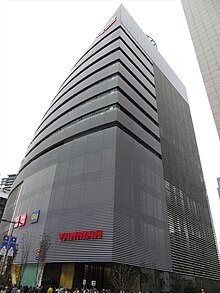Yanmar
 | |
| Company type | Privately held |
|---|---|
| Industry | Heavy Equipment Manufacturing |
| Founded | 1912 (as Yamaoka Hatsudoki Kosakusho) |
| Headquarters | 1-32, Chayamachi, Kita-ku, Osaka, Japan |
Key people | Takehito Yamaoka, President |
| Products | Diesel Engines Heavy Equipment Watercraft Unmanned aerial vehicles |
| Revenue | 703.8 Billion yen (March 2016) Consolidated |
Number of employees | 17,974 (consolidated as of March 31, 2016) |
| Website | https://www.yanmar.com/global/ |
Yanmar Co., Ltd. (ヤンマー株式会社, Yanmā Kabushiki-Gaisha) is a Japanese diesel engine manufacturer founded in Osaka, Japan in 1912. Yanmar manufactures and sells engines used in a wide range of applications, including seagoing vessels, pleasure boats, construction equipment, agricultural equipment and generator sets. It also manufactures and sells agricultural equipment, construction equipment, climate control systems, aquafarming systems, in addition to providing a range of remote monitoring services.[1]
Company description

Yanmar was founded in March 1912 in Osaka Japan[2] by Magokichi Yamaoka.[3][4]
When the company began in 1912, it manufactured gasoline-powered engines.[5] In 1920 the company began production of a small kerosene engine.[6] In 1933, it launched the world's first practical small diesel engine, the HB model.[5][7][8]
Yanmar also supplies engines to John Deere tractors[9] and for some Thermo King Corporation coolers used in refrigerated trucks and trailers.[10] Within the last 20 years, Yanmar has also established a growing presence in the domestic UAV market in Japan and elsewhere, with small helicopter UAVs primarily used in agricultural spraying and other forms of aerial application.[11][12]
As described on the company website, "The name [Yanmar] is a combination of the Yanma Dragonfly (known by names such as Oniyanma and Ginyanma) and the "Yama" from the name of the company founder Magokichi Yamaoka."[13]
Timeline


- 1912 - Yamaoka Magokichi sets up business under the name Yamaoka Hatsudoki Seisakusho (Yamaoka Engine Workshop).[14][15]
- 1933 - Production of world's first practical small diesel.[16]
- 1992 - The company produces its 10 millionth diesel engine.[17]
- 2015 - Yanmar acquired 70% of Spanish generator-set manufacturer HIMOINSA [18]
- 2016 - Yanmar increased its stake in the Indian company International Tractors, the maker of Sonalika branded tractors, to 30%.[19] The company also bought German compact equipment maker Schaeff and forged a partnership with Toyota to develop “next generation hulls” for boats.[20][21]
References
- ^ "Yanmar USA |". Yanmar USA. Retrieved 2018-08-26.
- ^ New Technology Japan. Japan External Trade Organization, Machinery and Technology Department. 2001.
- ^ World Engine Digest. John Martin Publications. 1980.
- ^ Steven D. Eppinger; Tyson R. Browning (25 May 2012). Design Structure Matrix Methods and Applications. MIT Press. pp. 196–. ISBN 978-0-262-30065-0.
- ^ a b World Fishing. IPC Industrial Press. 1992.
- ^ "World Engine Digest". J. Martin Publications. July 7, 1980 – via Google Books.
- ^ Vaclav Smil (30 July 2010). Prime Movers of Globalization: The History and Impact of Diesel Engines and Gas Turbines. MIT Press. pp. 125–. ISBN 978-0-262-29704-2.
- ^ Mining and Engineering. Thomson Newspapers Rhodesia. 1982.
- ^ John Dietz (15 January 2011). John Deere New Generation and Generation II Tractors: History, Models, Variations & Specifications 1960s-1970s. MBI Publishing Company. pp. 112–. ISBN 978-1-61060-110-8.
- ^ Chintamani Vasant Kulkarni (2007). Modeling and the Performance Analysis of Transportation Refrigeration Units with Alternate Power Systems. University of California, Davis.
- ^ Giuseppe Amoruso (19 July 2017). Putting Tradition into Practice: Heritage, Place and Design: Proceedings of 5th INTBAU International Annual Event. Springer. pp. 1542–. ISBN 978-3-319-57937-5.
- ^ Kristin Bergtora Sandvik; Maria Gabrielsen Jumbert (25 August 2016). The Good Drone. Taylor & Francis. pp. 1965–. ISBN 978-1-317-01752-3.
- ^ [1], About Brand page on yanmar.com; accessed 2016-01-14.
- ^ American Machinist. Penton Publications. January 1979.
- ^ Takeshi Abe; Douglas A. Farnie; David J. Jeremy; Tetuso Nakaoka; John F. Wilson (20 July 2005). Region and Strategy in Britain and Japan: Business in Lancashire and Kansai 1890-1990. Taylor & Francis. pp. 50–. ISBN 978-1-134-63045-5.
- ^ Sam McKinney (2004). Sailing with Vancouver: A Modern Sea Dog, Antique Charts and a Voyage Through Time. TouchWood Editions. pp. 181–. ISBN 978-1-894898-12-6.
- ^ "History|About YANMAR|YANMAR". YANMAR.
- ^ "Yanmar Acquires HIMOINSA|2015|News|YANMAR". YANMAR.
- ^ PM, Indulal; Mukherjee, Sharmistha (December 23, 2016). "Yanmar buys Blackstone's 18% stake in International Tractors". The Economic Times. The Times Group. Retrieved February 13, 2017.
- ^ Malone, Joe (January 30, 2017). "Schaeff machinery makes its return". International Rental News. KHL Group. Retrieved February 13, 2017.
- ^ Milberg, Evan (March 14, 2016). "Toyota Unveils New Boat Made with Composites". Composites Manufacturing. American Composites Manufacturers Association. Retrieved February 13, 2017.
External links
- Vehicle manufacturing companies established in 1912
- Companies based in Osaka Prefecture
- Engineering companies of Japan
- Japanese brands
- Robotics companies of Japan
- Diesel engine manufacturers
- Tractor manufacturers of Japan
- Defense companies of Japan
- Unmanned aerial vehicles of Japan
- Manufacturing companies established in 1912
- 1912 establishments in Japan
- Heavy equipment
- Marine engine manufacturers
- Engine manufacturers of Japan
